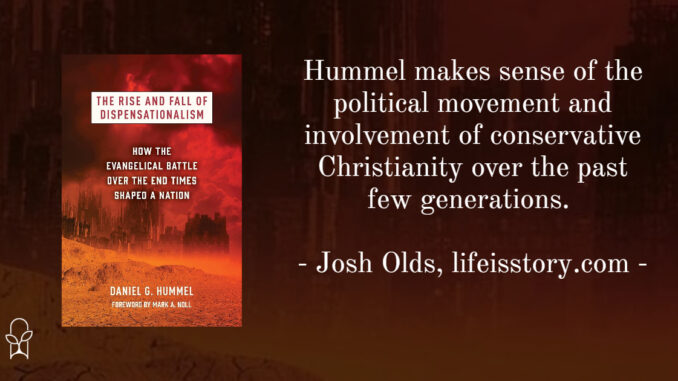
Published by Eerdmans on May 4, 2023
Genres: Academic, Non-Fiction, Politics, Theology
Buy on Amazon
Goodreads

A fascinating history of dispensationalism and its influence on popular culture, politics, and religion
In The Rise and Fall of Dispensationalism, Daniel G. Hummel illuminates how dispensationalism, despite often being dismissed as a fringe end-times theory, shaped Anglo-American evangelicalism and the larger American cultural imagination.
Hummel locates dispensationalism’s origin in the writings of the nineteenth-century Protestant John Nelson Darby, who established many of the hallmarks of the movement, such as premillennialism and belief in the rapture. Though it consistently faced criticism, dispensationalism held populist, and briefly scholarly, appeal—visible in everything from turn-of-the-century revivalism to apocalyptic bestsellers of the 1970s to current internet conspiracy theories.
Measured and irenic, Hummel objectively evaluates evangelicalism’s most resilient and contentious popular theology. As the first comprehensive intellectual-cultural history of its kind, The Rise and Fall of Dispensationalism is a must-read for students and scholars of American religion.
I have a confession: Growing up I read every single Left Behind book. I don’t just mean the 12 books in the original series. Or the 3 prequels and 1 sequel. Or the 40 middle grade books. I mean, I read all of the books, including the non-fiction tie-ins from Left Behind coauthor and dispensationalist Tim LaHaye. My childhood study Bible (a KJV Defender’s Study Bible) was also commentated on by a dispensationalist who interpreted the seven churches in Revelation as seven epochs of time, all culminating in the current age—the lukewarm church of Laodicea. Dispensationalism was my introduction to eschatology. It was virtually my introduction to theology that went beyond Sunday School simplicity (and this was anything but simple). In a word, with its wild predictions that took obscure symbolism and created concrete answers, dispensationalism enraptured me.
As I grew older and became more educated, I began to see some of the holes in dispensationalist eschatology. First of all, nobody agreed with one another. Tim LaHaye said “When the plain reading of Scripture makes sense, seek no other sense” and then proceeded to offer anything but a plain reading of Scripture. Eventually, for me, the system fell apart. But for many others, the belief remains. And more importantly, the implications of dispensationalism remain. Revealing those implications are at the heart of what Dr. Daniel Hummel does in The Rise and Fall of Dispensationalism. With precision and aplomb, Hummel offers a comprehensive exploration of the impact of dispensationalism on both American evangelicalism and the broader national culture. He breaks dispensationalism out of obscure theological discussions and shows how it has affected not just fundamentalist and evangelical Christianity but American culture as a whole—including its impact on political positions like climate change, support for Israel, and the defense budget.
The Rise and Fall of Dispensationalism is structured as a history; thus, Hummel works chronologically. John Nelson Darby is the father of dispensationalism and Part 1: The New Premillennialists 1830-1900 discusses the influence of Darby on American theology and how his thinking worked its way into the beliefs of other influential theologians and pastors such as Dwight Moody. Part 2 covers 1900-1960, when dispensationalism collided with fundamentalism. Hummel talks about the influence of the Scofield Reference Bible, Billy Graham, and others. Part 3, 1960-2020, sees the explosion of pop dispensationalism with Hal Lindsey, Pat Robertson, Tim LaHaye, and others, then sees its recession away from its height of popularity.
This is a clearly academic work. Hummel is thorough and comprehensive. I, who grew up steeped in dispensationalism, learned a lot about the movement’s history and how it affected the larger culture. The strength of the book is how it connects dispensationalism to political theology. Why do Christians often unequivocally support Israel? This is a very poignant question as Israel continues to murder Palestinian civilians in the name of destroying Hamas. The answer is dispensationalism. Why have conservative Christians downplayed the effects of climate change or humanity’s ability to influence it? Dispensationalism. Why are conservative Christians tied to nationalism? Dispensationalism. Concepts like the “world system” and the intertwining of religious and nationalistic rhetoric have remained a consistent thread in dispensationalist thinking, significantly impacting American political discourse. The Rise and Fall of Dispensationalism makes sense of the political movement and involvement of conservative Christianity over the past sixty years.
Hummel’s work is exemplary. It is a thorough and engaging study of dispensationalism’s profound influence on American evangelicalism and culture. The book is a crucial resource for anyone seeking to understand the historical, theological, and cultural underpinnings of this influential movement and its ongoing impact on American society. One thing I might press Hummel on, though: Has there really been a downfall? Sure, there is more pushback to it in theological circles and it is no longer part of the cultural zeitgeist like in the early 2000s in the wake of 9/11 and at the height of the Left Behind craze, but downfall seems like a very strong term to me. The effects of dispensationalism are still with us, embedded into our political and cultural systems. What this book shows us is that even if the theology goes away, we may still be left with its political and social implications.
